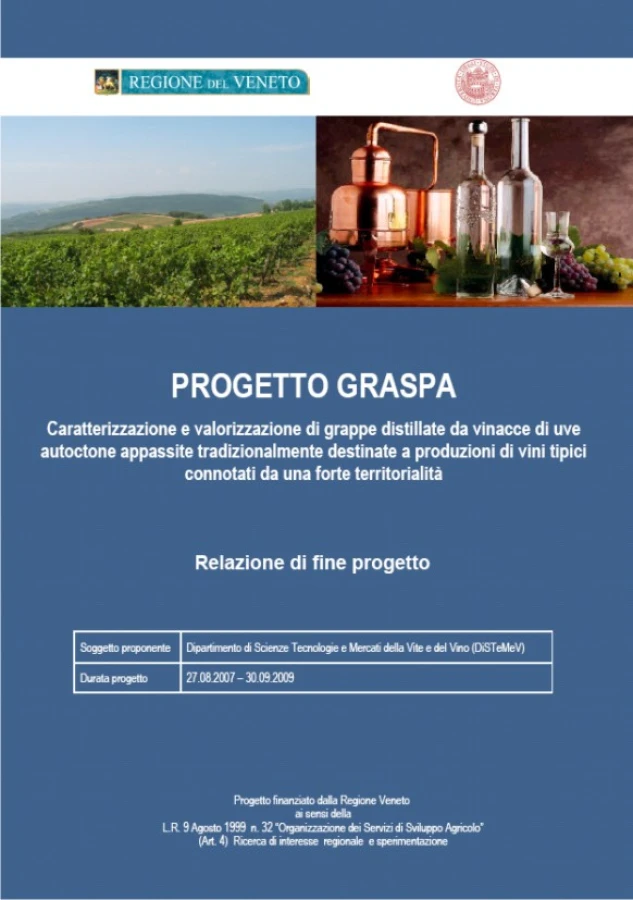Progetto Graspa
Description:
"The Graspa project"
In Veneto's wine production a significant commercial and image weight is taken up by passito wines, such as Amarone, Recioto of Valpolicella and Recioto of Soave and Gambellara. Next to these prestigious names there are other minor productions of passito wines, such as Breganze's Torcolato, the Passito Fior d'Arancio of the Euganean Hills, Fregona's Torchiato and Refrontolo Passito. There is, therefore, a great tradition in this sector, with a territorial character provided by a number of soil pedoclimatic factors affecting vines, including specific cultivation and oenological techniques. To these wines producers now want to match high quality Grappa productions that will take into account the most recent progress in grape marc treatment.
Veneto is the leading region in Italy for Grappa production, with approximately 40% of the national share and a large number of distilleries (about 40) of different production capacity, operating according to production techniques that are both traditional and quite innovative (as regards ensilage and distillation). Considerable commercial interest is now raised by the production of Grappa from dried grape marcs of the most illustrious passito wines, primarily Amarone, with some productions also destined to ageing.
The project aims at characterizing (in its different varietal and production aspects) and promoting grappas distilled from grape marcs of autochthonous grapes, dried according to tradition and destined to the production of typical wines with a strong territorial character, encouraging the optimization of production steps (from the duration of drying and the type of biological and microbiological evolution of grapes in that phase, to fermentation and storage of grape marcs), and the optimization of the aromatic profile of distillates, with appropriate interventions in the actual distillation process (carried out, wherever possible, using discontinuous systems).
With reference to various projects (completed or still in progress) on the drying in la "fruttaio" environment (with or without noble rot) of white and red grapes native of the Veneto region, promoted especially at Verona University - San Floriano campus, a Grappa production chain is being proposed, involving an over two year research project; in particular, during the first year:
a) the provision and control of grapes drying for the production of Amarone and Recioto di Soave, both on a pilot and industrial production scale;
b) the sampling, during the drying process, of small batches for microvinification and distillation with a laboratory alembic (at least 8 batches per type of grapes);
c) the sampling, in at least 3 phases (initial, end of drying and after inoculation of Botritys cinerea), of about 0.4-0.5 ton batches of grapes used for traditional wine making, in order to have grape marcs to then adequately treat for industrial alembic distillation;
d) the control of raw materials and the analysis of at least 3 industrial productions of the 2 types of grappa, aiming, for the second year and according to the results obtained in the first year, at:
- a targeted riproposition of part of the research on the state of the drying process (duration and microbiology) for the 2 types seen in the first year (control and microdistillation);
- control of industrial productions (at least 3 per type) with a few possible variants;
- control of raw materials, at least at three different times, and production of grappas from the minor listed types of passito grapes, possibly on a semi-industrial scale.
Finally, we must point out the need to operate through the microvinification of monovarietal grapes, and obtain distillates both with the use of minidistillers and at industrial level. Part of the grape samples and distillates - sometimes even the head and tail fractions - will be subjected to a thorough investigation of their aromatic composition and to a sensory evaluation in order to identify their more characterizing components, when compared to non-wilted grapes. At the end of the first year, and at the conclusion of the project, seminars will be held to illustrate the results obtained. Operators and tasting experts will be involved in Grappa tasting and in identifying its most characterizing notes.
-
If you wish to download the entire document, please send a request to info@grappa.com specifying the title of the text you wish to receive, the reason for this request and full applicant details.
Thank you.
POLI GRAPPA MUSEUM
Biographical Notes:
Photogallery:
Request Document
To download the entire document, please send a request by filling out the form.
The fields marked with (*) are mandatory
Download Document
Log in to access reserved documents.


